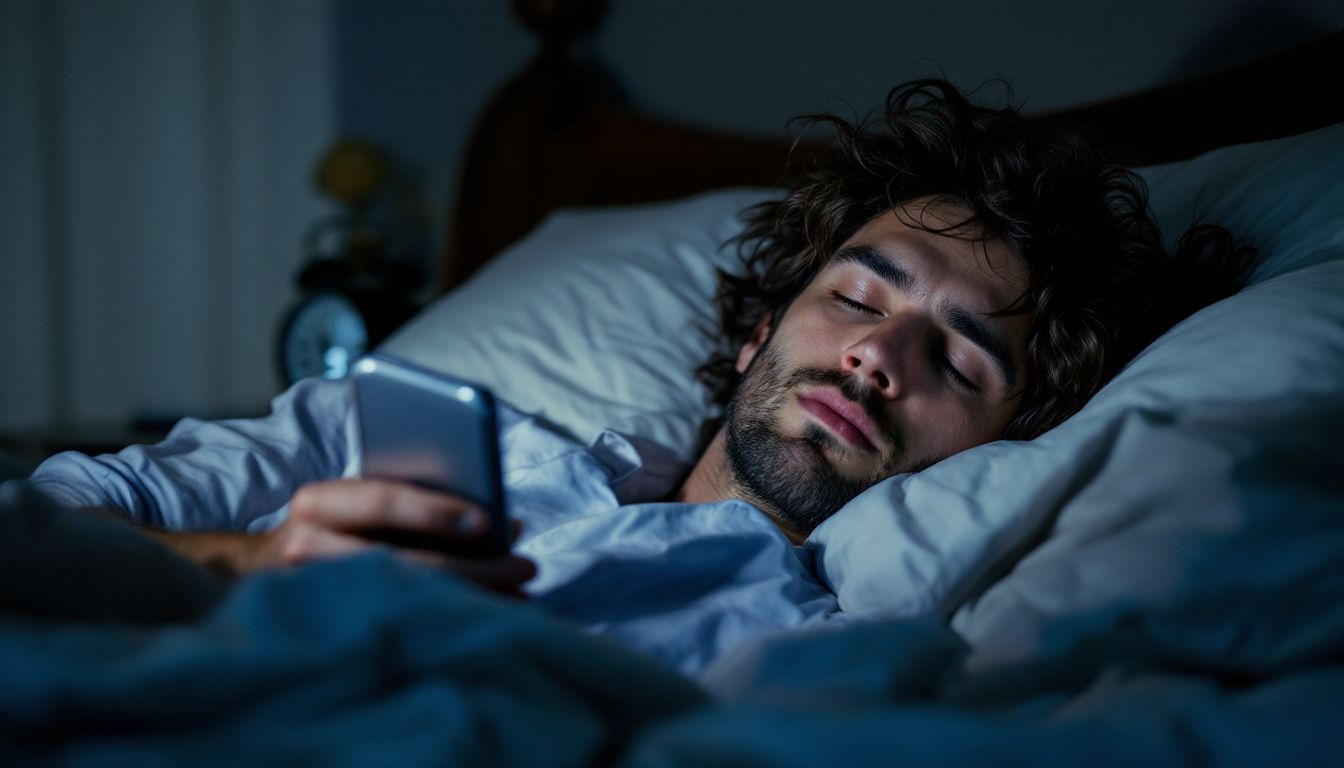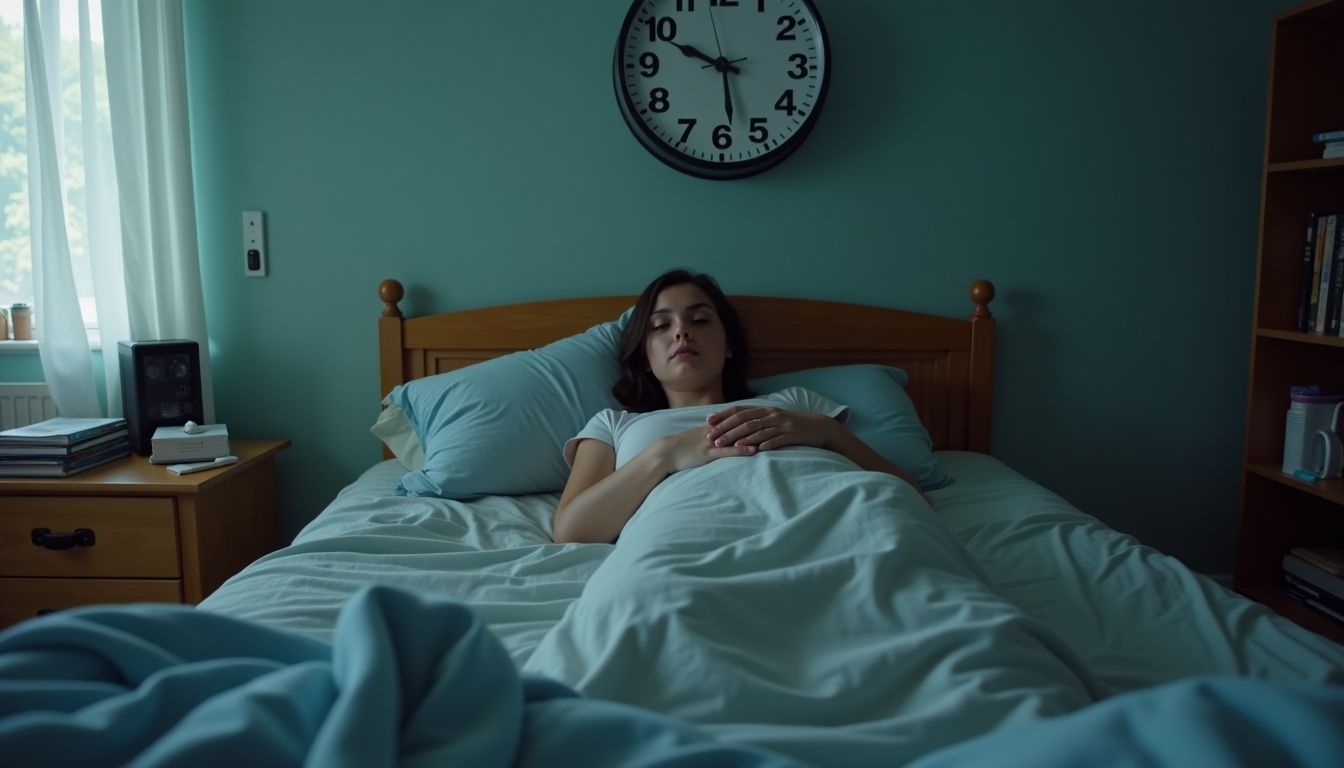Feeling tired all the time is a common problem. Sleep deprivation happens when you don’t sleep enough. This blog will show ways to fix this issue. Keep reading to learn more.
What is Sleep Deprivation?

Sleep deprivation occurs when a person doesn’t get enough sleep. It’s different from insomnia and can affect anyone, but some people are more prone to it than others.
Difference Between Sleep Deprivation and Insomnia
Sleep deprivation and insomnia are not the same thing. Insomnia means having trouble falling asleep even when you have the chance. People with insomnia can’t sleep well at night. On the other hand, sleep deprivation happens when someone does not give enough time for sleeping.
They might stay up too late or wake up too early.
Both problems affect how you feel during the day. If you don’t get enough sleep, you will feel tired and may have trouble thinking clearly. Your body needs rest to work right, so it’s important to know if you have insomnia or are just not giving yourself enough time to sleep.
Who is Most Affected?
Teens and adults in the U.S. feel the impact of sleep deprivation more than other groups. Nearly 50% of adults in the U.S. have trouble sleeping. Teens face changes in their biological clocks, leading to late nights and early mornings for school, which cuts into their sleep time.
About one-third of adults get less than seven hours of shut-eye each night, falling short of what they need for good health.
People with jobs that disrupt normal sleep patterns, like shift work, are also likely to suffer from lack of sleep. This includes nurses, doctors, police officers, and others who work at night or irregular hours.
They struggle because their jobs do not match our natural day-night cycle. These groups show clear signs they are not getting enough rest due to their schedules or age-related changes.
Causes of Sleep Deprivation

Insomnia can result from different lifestyle factors and medical conditions. Elements like irregular work schedules, excessive use of electronic devices before bedtime, stress, or underlying sleep disorders can contribute to insufficient sleep. Moreover, medical conditions such as sleep apnea, restless legs syndrome, or chronic pain can also lead to inadequate sleep.
Lifestyle Factors
Lifestyle decisions significantly influence the quality of sleep. Night shifts can disrupt your body’s time schedule, also known as the circadian rhythm, potentially leading to persistent lack of sleep.
Overconsumption of alcohol or excessive caffeine can equally disrupt beneficial sleep. These practices can prevent you from either falling asleep or maintaining it.
Poor sleep habits present another problem. Increased stress levels or frequent change of sleeping locations can make falling asleep a challenge. Maintaining a soothing bedtime routine and dedicating your bedroom solely for sleep and relaxation is beneficial.
This process provides cues to your brain that it’s time to wind down for the night, improving your sleep quality and assisting in avoiding health issues associated with insufficient sleep.
Medical Conditions
After talking about lifestyle factors, it’s time to look at medical conditions that cause sleep problems. Conditions like sleep apnea, insomnia, restless leg syndrome, and parasomnias can make sleeping hard.
People with chronic pain or mental health issues such as anxiety, depression, and PTSD also find it tough to get enough rest. Diseases of the brain that get worse over time, including Alzheimer’s and Parkinson’s disease, can disrupt sleep too.
These health problems don’t just affect how long someone sleeps but also their sleep quality. For example, a person with obstructive sleep apnea may stop breathing for short times during the night.
This makes deep rest impossible and leads to daytime tiredness. Mental health disorders can ruin sleep patterns as well. Stressful feelings keep the brain alert when it should be calm for bedtime.
Symptoms of Sleep Deprivation

Sleep deprivation can cause physical symptoms like fatigue and headaches. It can also lead to mental and emotional symptoms such as irritability and difficulty concentrating.
Physical Symptoms
People who don’t get enough sleep often feel very tired during the day. They might find it hard to stay awake or focus. Their reactions can be slow. Many also have headaches. Not getting enough sleep can lead to serious problems like high blood pressure, stroke, heart attack, and obesity.
Some people may experience microsleeps without knowing it. This means they fall asleep for a few seconds or minutes during the day. Others might see things that are not there (hallucinations) or make bad choices because their judgment is off.
A condition called nystagmus, where the eyes move uncontrollably, can also happen.
Mental and Emotional Symptoms
Lack of sleep hurts our brains and feelings. It makes learning hard, messes up memory, weakens the immune system, and harms emotional control. People who don’t get enough sleep feel more upset easily.
They can become very moody or even sad.
Risks for big health problems like Alzheimer’s disease grow with bad sleep. Minds struggle without rest, leading to trouble thinking clearly or making decisions. Tiredness during the day can make someone feel unstable on an emotional level.
Effects of Sleep Deprivation on the Body

Sleep deprivation affects brain function, leading to reduced alertness and impaired cognitive performance. It also impacts physical health, increasing the risk of chronic diseases such as heart disease and type 2 diabetes.
Impact on Brain Function
Not getting enough sleep hurts brain function. It makes learning hard and memory weak. This can lead to a higher chance of getting Alzheimer’s disease and other brain problems. Some people might see or hear things that are not there if they miss too much sleep.
Next, we will look at how not sleeping enough affects your body’s health.
Effects on Physical Health
Sleep deprivation can hurt your body in many ways. It raises your chance of getting Type 2 diabetes, high blood pressure, strokes, heart attacks, vascular disease, and becoming overweight.
These problems happen because not sleeping enough changes the way your body works. Your heart and blood vessels need rest to work well.
Not sleeping enough also makes you feel very tired during the day. You may get headaches and react slowly to things around you. Feeling tired all the time can make it hard to stay healthy and active.
Next, we’ll talk about how sleep loss affects your mind.
Effects on Mental Health
Not getting enough sleep hurts our mental health. It makes problems like depression, worry, and PTSD worse. This creates a bad cycle where not sleeping well and mental health problems make each other stronger.
Sleep deprivation also leads to trouble managing emotions. People may feel more upset or have sudden changes in mood. Lack of rest can increase feelings of stress and make it hard to enjoy daily life.
Long-term Consequences of Sleep Deprivation
Chronic sleep deprivation can lead to an increased risk of developing chronic diseases, affecting cardiovascular health and increasing the chances of cognitive decline and dementia.
It also impacts immune function, leading to a higher susceptibility to illnesses such as type 2 diabetes and mood disorders like anxiety and depression.
Risk of Chronic Diseases
Chronic lack of sleep can result in serious health problems. It raises the likelihood of developing Type 2 diabetes, high blood pressure, stroke, heart attack, vascular disease, and obesity.
Those experiencing chronic sleep deprivation are more likely to have cardiovascular disease, obesity, and diabetes.
Inadequate sleep affects the body’s hormone regulation, impacting stress and appetite. This disturbance raises the risk for chronic diseases like Type 2 diabetes and cardiovascular conditions including high blood pressure and stroke.
Moreover, insufficient rest harms the body’s immune system, increasing susceptibility to infections and other illnesses.
Impact on Cognitive Performance
Moving from the potential long-term health effects of sleep deprivation to its impact on cognitive performance, it’s crucial to understand that impaired learning, memory, and cognitive functions are significant concerns.
A lack of quality sleep can lead to diminished alertness and reduced attention span during waking hours, which can affect decision-making capabilities and result in slowed reaction times.
Moreover, it’s essential to recognize that chronic sleep deprivation has been linked to an increased risk of Alzheimer’s disease and other neurological conditions. These factors highlight the importance of prioritizing healthy sleep habits for maintaining optimal cognitive function.
Keywords: Sleep Deprivation, Cognitive Performance, Impaired Learning, Memory Function, Alzheimer’s Disease Awareness.
Managing Sleep Deprivation
To manage sleep deprivation, treatment options and lifestyle changes can be effective. Building a healthy sleep routine and following sleep hygiene tips are essential in addressing sleep deprivation.
Treatment Options
Treatment options for sleep deprivation encompass lifestyle changes and medical interventions. Lifestyle adjustments, including establishing a consistent sleep schedule, maintaining a comfortable sleeping environment, avoiding caffeine and electronic devices before bedtime, and engaging in regular physical activity, can help enhance sleep quality.
Medical treatments may involve the use of specialized devices or positive airway pressure machines for conditions such as sleep apnea. While medications can aid in initiating sleep, they should be used with caution due to their potential for habit formation.
Researchers at the Indiana Sleep Center have found that these treatment approaches have effectively improved overall sleep quality for individuals struggling with chronic sleep deprivation.
Furthermore, it’s important to note that clinical studies published by the National Library of Medicine provide evidence supporting lifestyle modifications as a significant way to manage insufficient sleep patterns.
Additionally, cognitive behavioral therapy for insomnia has also demonstrated promising results in addressing the long-term consequences of chronic insomnia.
Lifestyle Changes
To manage sleep deprivation, it is important to make lifestyle changes. Establishing consistent sleep routines is vital for improving sleep quality. Additionally, reducing exposure to light and screen usage before bedtime aids in better relaxation for a restful night.
Refraining from heavy meals and alcohol before bed can also enhance the chances of obtaining a proper amount of rest during the night. Engaging in regular physical activity during the day has been proven to contribute to improved sleep patterns.
These adjustments can significantly impact overall sleep hygiene and help alleviate chronic sleep deprivation, ultimately promoting better health. Furthermore, establishing a healthy sleep routine through these lifestyle changes not only supports mental wellbeing but also strengthens the immune system against diseases such as type 2 diabetes and cardiovascular issues, showcasing how simple adjustments can yield considerable benefits.
Preventing Sleep Deprivation
To prevent sleep deprivation, focus on improving your sleep hygiene and creating a healthy sleep routine. Incorporate relaxation techniques and limit screen time before bedtime to promote better sleep quality.
Sleep Hygiene Tips
Maintain a consistent sleep-wake schedule to enhance sleep quality and overall health. Reduce the use of electronics before bedtime, as exposure to blue light can disturb your natural sleep cycle.
Refrain from consuming caffeine and alcohol in the evening, as these substances can hinder falling asleep and hinder deep restorative REM sleep. Adopting these habits can promote better sleep hygiene and ultimately decrease the risk of chronic medical conditions associated with insufficient or poor-quality sleep.
Building a Healthy Sleep Routine
Shifting from sleep hygiene tips, constructing a healthy sleep routine is vital for managing sleep deprivation. It’s important to establish a dark, quiet, and cool sleeping environment.
Participating in regular exercise and relaxation techniques can help enhance the quality of your sleep. If you encounter persistent issues with your sleep patterns, it’s essential to seek guidance from healthcare professionals on how to establish a healthy routine.
Establishing an optimal environment for restfulness through calming elements like darkness and quietness can significantly influence the quality of your sleep. Additionally, maintaining physical activity and integrating relaxation methods into your daily routine can contribute to achieving better overall sleep health.
Seeking professional advice when faced with chronic or severe sleeping difficulties can provide personalized solutions best suited to individual needs.
Conclusion
Lack of sleep can have serious effects on health. It influences brain function, physical well-being, and mental health. Prolonged effects may heighten the likelihood of chronic illnesses and affect cognitive performance.
Managing and preventing sleep deficiency is crucial for overall well-being. Consulting healthcare providers and adopting lifestyle changes are pivotal steps to enhance sleep quality.
Making good sleep a priority is vital for a healthy life.

